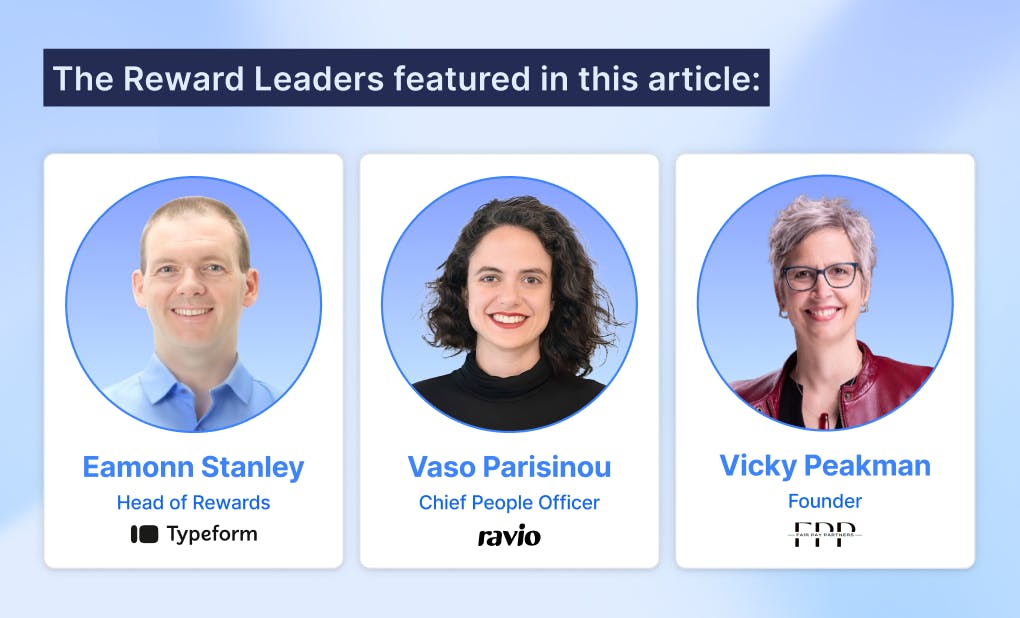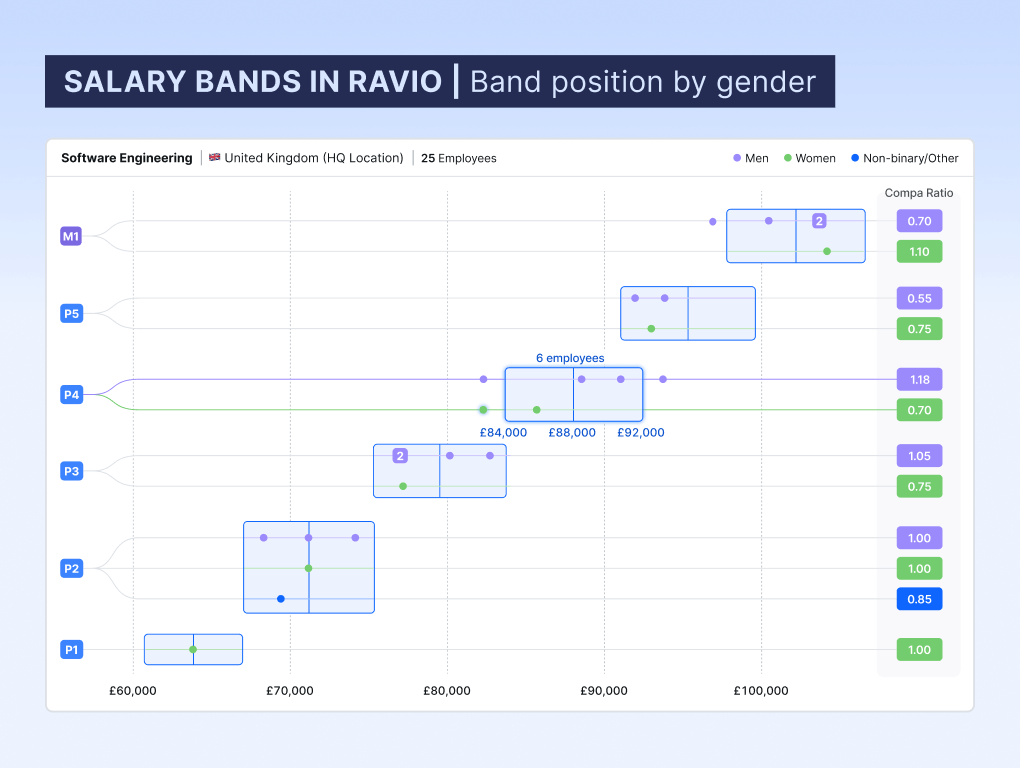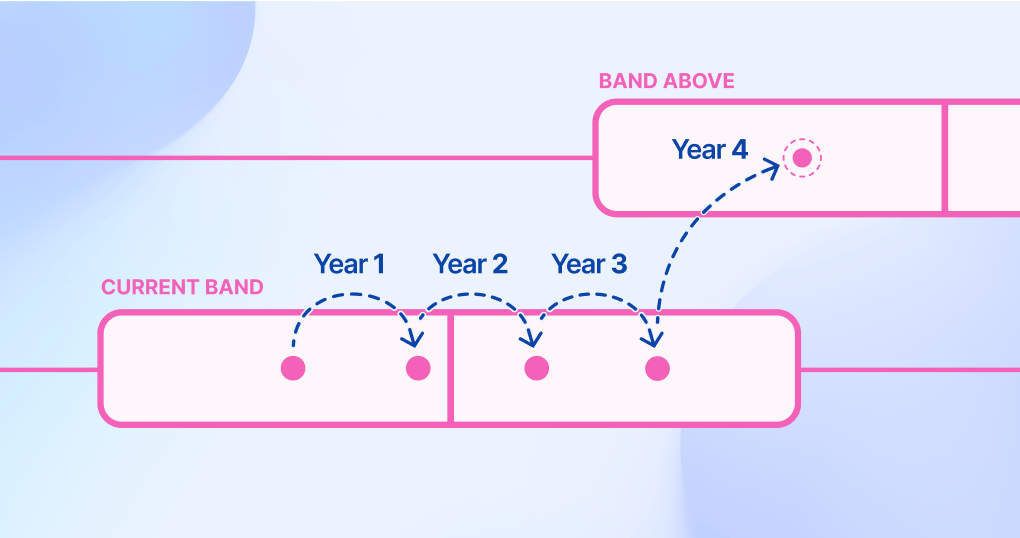Effective compensation communication doesn’t stop with the HR team.
It’s line managers who are having those day-to-day conversations about compensation with their direct reports.
And sometimes, those conversations can be difficult – especially when it comes to performance or pay review outcomes, and especially for new or nervous managers.
So how can we prepare managers to communicate effectively about compensation, and handle those different pay conversations?
We asked Eamonn Stanley (Total Reward Lead at Supercell), Vicky Peakman (Founder of Fair Pay Partners), and Vaso Parisinou (Chief People Officer at Ravio) what works in their experience

How to ensure line managers are well-prepared for effective compensation conversations with employees
Line managers are on the frontlines of compensation communication, fielding questions about pay, explaining review outcomes, and managing expectations around progression.
Yet many organisations underinvest in preparing managers for these crucial conversations.
"Blaming managers for poor communication can be a bit of a crutch," says Vicky Peakman, Founder of Fair Pay Partners. "In reality it often indicates that the approach isn't clear enough or managers haven't received enough guidance."
Getting compensation conversations right requires a systematic approach to manager preparation, with three key areas: comprehensive training, clear protocols, and practical confidence-building.
1. Invest in comprehensive manager training on compensation
Before diving into training materials, Eamonn Stanley, Total Reward Lead at Supercell, recommends "gauging where your team is at as a first step."
In his experience, managers tend to have "varying degrees of knowledge about how compensation works" – some will struggle with fundamental concepts like benchmarking or compa ratios, whilst others will be well-versed in compensation structures.
Taking a step back and understanding what that looks like helps you to then "build a tailored plan based on the specific needs of your management team."
Once you understand the knowledge gaps, focus training on two levels:
- General compensation education covering key concepts like compensation benchmarking, salary bands, pay equity, and so on. This gives managers the vocabulary and framework to have informed conversations.
- Company-specific training on your compensation philosophy and structures – how decisions are made relating to compensation and why, as well as all the processes that go into this, from making new hire decisions to your compensation review cycles. Managers need to internalise in order to relay information to their direct reports with the right context.
This isn’t a ‘one and done’ scenario, it needs regular refreshers and different mediums to ensure managers are fully equipped – like 1:1 training sessions for every new manager, but also documented guidance or recordings to give managers something to refer to ahead of each compensation conversation with their team.
For Vaso Parisinou, Chief People Officer at Ravio, sharing the market benchmarks that inform your approach can be particularly powerful to aid manager understanding.
"Having the context of both the external market and the internal reality of compensation equips managers to have better, more informed conversations with their team members,” she explains.

Ravio salary bands – showing employee pay and market alignment
2. Establish clear responsibilities and communication protocols
Managers need clarity on their role in compensation conversations, and what's expected of them.
"Be clear about the role of the Rewards team and the role of the line manager when it comes to compensation communication," advises Vaso Parisinou.
This means explicitly defining:
- Which conversations managers own (performance feedback, review outcomes)
- Which require HR involvement (policy exceptions, discrimination concerns)
- What information managers can and cannot share (individual salaries, confidential decisions)
- When to escalate or defer (complex equity questions, legal matters)
And clarity isn't just about boundaries – it's about accountability too.
In Vaso's experience, "even with the most comprehensive manager training programme in the world, there are often managers who have consistently poor conversations with their direct reports about pay and progression."
One common example is managers who deflect difficult conversations by blaming HR or "the process" rather than owning the decision. "It's not uncommon to hear feedback from employees that their manager has said something like 'I advocated for you to get a pay raise but it was vetoed by the HR team'," Vaso explains.
"It's important to be clear with managers that communicating clearly, accurately, and empathetically with their team members about compensation is a core requirement of their role as a team lead," she advises. "The People team is there to support them however they need, but it's their responsibility to take that support into effective conversations."
This accountability should be built into role descriptions and performance evaluations for managers – consistently poor compensation communication should have consequences, just like any other core management skill.
3. Build manager confidence through practical preparation
Knowledge and protocols provide the foundation, but confidence comes from practice – so it’s also vital to give managers hands-on experience before they face real conversations.
This might include:
- Conversation guides. Documented examples for common scenarios (especially those difficult conversations about compensation), with suggested responses.
- Role-playing exercises. Working through scenarios in a stress-free environment can help to reduce nerves and build manager muscle memory for real compensation conversations. Some companies are introducing AI tools that simulate conversations, supporting training for managers and offering on-hand support to practice those difficult compensation discussions – and receive feedback too.
- Emotional intelligence education. Preparation isn’t just about what to say, it’s also about how to say it. Active listening techniques for truly hearing employee concerns, empathy without over-promising, and strategies for staying calm.
This final point on emotional intelligence is one that Eamonn Stanley has found to be particularly important.
“Every conversation about pay should start with empathy and active listening,” explains Eamonn, “and that’s especially true when it’s a negative outcome – it isn’t going to be an easy conversation for the employee, so the manager needs to take extra care."
With the right combination of knowledge, clear expectations, and practical preparation, managers can transform from reluctant messengers to confident communicators who strengthen rather than strain the employee relationship.
Real-world examples: Scenario planning the most common tricky compensation conversations
We’ve seen that sharing examples or role-playing potential scenarios can be particularly helpful in preparing managers for difficult compensation conversations.
So, to help, we asked Eamonn and Vicky to walk through how they would approach four of the most common challenging scenarios that arise during compensation review season – something to with your managers to help them feel prepared.
Scenario 1: The employee has poor performance feedback and will receive no/low salary increase
“Start with empathy and active listening,” says Eamonn, “that’s true with all conversations about pay, but especially when it isn’t the best outcome. It isn’t going to be an easy conversation for the employee, so the manager needs to take extra care.”
From there, it’s all about providing as much clarity as possible.
“Explain exactly what the poor performance has been, with clear examples against the documented expectations for the role,” Eamonn advises, “In an ideal world, this shouldn’t come as a surprise because feedback and open communication should be taking place between manager and employee all year round, not just during the merit cycle.”
“Next explain how performance relates to pay within the company’s compensation philosophy, so that the employee has a clear understanding of why their performance is leading to no salary increase for them this time round.”
“And finally explain what improvements the employee can make to ensure a better outcome next time,” Eamonn says, “the manager should be working collaboratively with them to implement goals and development support to help them meet those goals.”
Scenario 2: The employee has performed well but will receive no salary increase due to their high position in band
For Vicky, the first step is to explain the logic and rationale that is behind this decision.
“Ensure the manager is clear about the rules for employees who are at the top of their salary band but still performing highly,” she says, “and that they can explain this to the employee without causing confusion.”
“It’s also worth highlighting the reasons for those rules,” Vicky suggests, “in most cases these limitations are in place to avoid inconsistencies and pay equity issues within the team. We all naturally want to be paid more, but if we can see how it would be unfair to our peers, it’s more likely to be understood.”
In many companies, even if a high-performing employee with a high compa ratio is ineligible for a salary increase, there will be other compensation levers to use to recognise and reward their achievements and avoid regrettable attrition.
“We should be working with the manager in this scenario to offer an alternative reward for the employee,” Vicky advises, “which could be an equity refresh grant or a backward-facing performance bonus, or additional holiday days, and so on.”
“I’d also suggest that a large part of the conversation should focus on growth and development. If this employee is already at the top of their pay band and is still performing highly, then the manager should be working with them on a plan to demonstrate that they have the required skills and experience to be ready for a promotion to the next level and salary band.”

Scenario 3: The employee was expecting a higher salary increase (or bonus, equity refresher, etc) and is disappointed
“Firstly, acknowledge the employee's concerns and frustrations with the outcome,” says Eamonn, “as always, when it comes to communicating compensation, leading with empathy is key.”
Next, provide context for the decision. “Explain why they are receiving the compensation adjustment that they are,” says Eamonn, “whether that’s about their performance, budget limitations, internal fairness, they need to be clear on the rationale.”
“It’s also important to try and understand why the employee was expecting a higher salary increase. If they’re seeing higher salaries for their role within the market, that’s important context for you to know. Equally, if there was a miscommunication somewhere along the line about the approach to pay increases, that’s important feedback too.”
“End with a more positive and future-thinking discussion on the employee’s value to the company, their future earning potential, and plans that they can put in place with their manager to ensure they reach that earning potential.”
Scenario 4: The employees questions the fairness of the pay review outcome
Questions like ‘why am I not getting a pay increase or promotion when they are’ can arise during compensation review conversations.
For Vicky, when fairness is brought into the conversation, the most important thing is to “listen and take the concerns seriously.”
“There’s always a chance that there is bias or discrimination happening,” Vicky says, “and that should be taken seriously and investigated every time.”
Beyond this, in this kind of scenario it’s particularly important that managers are well-versed on the compensation approach, and particularly how the company ensures consistent and fair pay decisions are made – especially within the context of the pay review process.
“The manager needs to be able to explain how pay increases and promotions are determined,” Vicky says, “and the parts of the process that are designed to ensure these decisions are fair and maintain internal pay equity – like market alignment, compa ratio analysis, calibration sessions, and so on.
“In this particular example, it’s also important to keep the conversation focused on the employee concerned,” Vicky advises, “rather than talking about why other employees are receiving the adjustments that they are.”
“The aim is to show the employee that they aren’t being treated unfairly in the decision that’s been made. Also highlight that they have the power to influence their own compensation package, through performance and meeting development goals towards promotion.”



